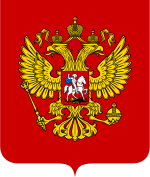
Back Рәсәй Федерацияһы Граждан Кодексы Bashkir Грамадзянскі кодэкс Расійскай Федэрацыі Byelorussian Zivilgesetzbuch (Russland) German ロシア連邦民法典 Japanese Rusijos Federacijos civilinis kodeksas Lithuanian Kodeks cywilny Federacji Rosyjskiej Polish Гражданский кодекс Российской Федерации Russian
| Civil Code of Russia | |
|---|---|
 | |
| Parliament of Russia | |
| Territorial extent | Russia |
| Enacted by | Parliament of Russia |
| Signed by | President of Russia |
| Signed | 1994 |
| Commenced | 1 January 1995 |
| Status: In force | |
The Civil Code of the Russian Federation (Russian: Гражданский кодекс Российской Федерации, frequently abbreviated 'ГК РФ') is the prime source of civil law for the Russian Federation. The Russian Civil Law system descended from Roman Law through Byzantine tradition. It was heavily influenced by German and Dutch norms in the 18th and 19th centuries. Socialist-style modifications took place during the Soviet period (1922–1991) and Continental European Law influences since the 1990s.
The Civil Code of the Russian Federation came into force in four parts. The first part, which deals with general provisions (i.e. defines sources, names legal entities etc.) was enacted by the State Duma in 1994 and entered into force in 1995. The second part (dealing with the Law of obligations) entered into force in 1996. The third part (Succession law) entered into force in 2002. The document has certain basic principles: equality of all participants guaranteed by civil law, inviolability of private property, freedom of contract, free exercise of civil rights and juridical protection of civil rights.
The fourth part, dealing with intellectual property, was signed into law on December 18, 2006 and came into force on January 1, 2008. Part IV became the first truly complete codification of the legislation on intellectual property in the world.